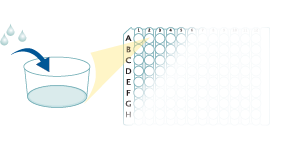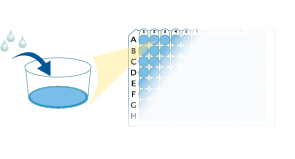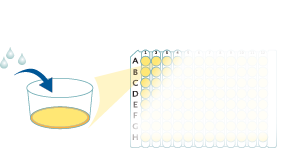Canine TNF-alpha Quantikine ELISA Kit Summary
Product Summary
Recovery
The recovery of canine TNF-alpha spiked to levels throughout the range of the assay in various matrices was evaluated.
| Sample Type | Average % Recovery | Range % |
|---|---|---|
| Cell Culture Supernates (n=7) | 99 | 83-109 |
| EDTA Plasma (n=6) | 94 | 82-103 |
| Heparin Plasma (n=6) | 94 | 88-103 |
| Serum (n=6) | 92 | 83-106 |
Linearity
Scientific Data
Product Datasheets
Preparation and Storage
Background: TNF-alpha
Tumor necrosis factor alpha (TNF-α), also known as cachectin and TNFSF2, is the prototypic ligand of the TNF superfamily. It is a pleiotropic molecule that plays a central role in inflammation, apoptosis, and immune system development. TNF-α is produced by a wide variety of immune and epithelial cell types. Human TNF-α consists of a 35 amino acid (aa) cytoplasmic domain, a 21 aa transmembrane segment, and a 177 aa extracellular domain (ECD). Within the ECD, human TNF-α shares 97% aa sequence identity with rhesus and 71% - 92% with bovine, canine, cotton rat, equine, feline, mouse, porcine, and rat TNF-α. The 26 kDa type 2 transmembrane protein is assembled intracellularly to form a noncovalently linked homotrimer. Ligation of this complex induces reverse signaling that promotes lymphocyte costimulation but diminishes monocyte responsiveness.
Cleavage of membrane bound TNF-α by TACE/ADAM17 releases a 55 kDa soluble trimeric form of TNF-α. TNF-α trimers bind the ubiquitous TNF RI and the hematopoietic cell-restricted TNF RII, both of which are also expressed as homotrimers. TNF-α regulates lymphoid tissue development through control of apoptosis. It also promotes inflammatory responses by inducing the activation of vascular endothelial cells and macrophages. TNF-α is a key cytokine in the development of several inflammatory disorders. It contributes to the development of type 2 diabetes through its effects on insulin resistance and fatty acid metabolism.
Assay Procedure
Refer to the product- Prepare all reagents, standard dilutions, and samples as directed in the product insert.
- Remove excess microplate strips from the plate frame, return them to the foil pouch containing the desiccant pack, and reseal.
- Add 50 µL of Assay Diluent to each well.
- Add 50 µL of Standard, Control, or sample to each well. Tap the plate gently for 1 minute. Cover with a plate sealer, and incubate at room temperature for 2 hours.
- Aspirate each well and wash, repeating the process 4 times for a total of 5 washes.
- Add 100 µL of Conjugate to each well. Cover with a new plate sealer, and incubate at room temperature for 1 hour.
- Aspirate and wash 5 times.
- Add 100 µL Streptavidin-HRP to each well. Cover with a new plate sealer, and incubate at room temperature for 30 minutes.
- Aspirate and wash 5 times.
- Add 100 µL Substrate Solution to each well. Incubate at room temperature for 30 minutes. PROTECT FROM LIGHT.
- Add 100 µL of Stop Solution to each well. Gently tap the plate to ensure thorough mixing. Read at 450 nm within 30 minutes. Set wavelength correction to 540 nm or 570 nm.






Citations for Canine TNF-alpha Quantikine ELISA Kit
R&D Systems personnel manually curate a database that contains references using R&D Systems products. The data collected includes not only links to publications in PubMed, but also provides information about sample types, species, and experimental conditions.
18
Citations: Showing 1 - 10
Filter your results:
Filter by:
-
Phase I/II Trial of Urokinase Plasminogen Activator-Targeted Oncolytic Newcastle Disease Virus for Canine Intracranial Tumors
Authors: Rossmeisl, JH;King, JN;Robertson, JL;Weger-Lucarelli, J;Elankumaran, S;
Cancers
Species: Canine
Sample Types: Serum
-
Effects of SKCPT on Osteoarthritis in Beagle Meniscectomy and Cranial Cruciate Ligament Transection Models
Authors: Kim, HM;Kang, M;Jung, YS;Lee, YJ;Choi, W;Yoo, H;Kim, J;An, HJ;
International journal of molecular sciences
Species: Canine
Sample Types: Synovial Fluid
-
Translation of immunomodulatory therapy to treat chronic heart failure: Preclinical studies to first in human
Authors: HD Humes, KD Aaronson, DA Buffington, HN Sabbah, AJ Westover, LT Yessayan, B Szamosfalv, FD Pagani
PLoS ONE, 2023-04-06;18(4):e0273138.
Species: Canine
Sample Types: Serum
-
Translation of immunomodulatory therapy to treat chronic heart failure: Preclinical studies to first in human
Authors: HD Humes, KD Aaronson, DA Buffington, HN Sabbah, AJ Westover, LT Yessayan, B Szamosfalv, FD Pagani
PLoS ONE, 2023;18(4):e0273138.
Species: Canine
Sample Types: Serum
-
Mycobacterium intracellulare induces a Th17 immune response via M1-like macrophage polarization in canine peripheral blood mononuclear cells
Authors: S Kim, YS Hyun, HT Park, MK Shin, HS Yoo
Scientific Reports, 2022-07-12;12(1):11818.
Species: Canine
Sample Types: Cell Culture Supernates
-
Effect of Cannabidiol (CBD) on Canine Inflammatory Response: An Ex Vivo Study on LPS Stimulated Whole Blood
Authors: E Gugliandol, P Licata, AF Peritore, R Siracusa, R D'Amico, M Cordaro, R Fusco, D Impellizze, R Di Paola, S Cuzzocrea, R Crupi, CD Interlandi
Veterinary sciences, 2021-09-04;8(9):.
Species: Canine
Sample Types: Whole Blood
-
Inflammation and its association with oxidative stress in dogs with heart failure
Authors: A Nemec Svet, B Verk, N ?ebulj-Kad, J Salobir, V Rezar, A Domanjko P
Bmc Veterinary Research, 2021-04-26;17(1):176.
Species: Canine
Sample Types: Serum
-
Effect of modified ultrafiltration on cytokines and hemoconcentration in dogs undergoing cardiopulmonary bypass
Authors: H Suzuki, N Oshima, T Watari
J Vet Med Sci, 2020-10-05;0(0):.
Species: Canine
Sample Types: Plasma
-
A preliminary study assessing cytokine production following ex vivo stimulation of whole blood with diet in dogs with chronic enteropathy
Authors: A Kathrani, E Hall
BMC Vet. Res., 2019-06-04;15(1):185.
Species: Canine
Sample Types: Cell Culture Supernates
-
Clinical Assessment of Intravenous Endothelial Progenitor Cell Transplantation in Dogs
Authors: SH Lee, JC Ra, HJ Oh, MJ Kim, EMN Setyawan, YB Choi, JW Yang, SK Kang, SH Han, GA Kim, BC Lee
Cell Transplant, 2019-04-24;0(0):9636897188216.
Species: Canine
Sample Types: Serum
-
Evaluation of the in vitro effect of Boldo and Meadowsweet plant extracts on the expression of antimicrobial peptides and inflammatory markers in canine keratinocytes
Authors: D Santoro, K Ahrens, R Vesny, C Navarro, H Gatto, R Marsella
Res. Vet. Sci., 2017-05-17;115(0):255-262.
Species: Canine
Sample Types: Cell Culture Supernates
-
Higher neonatal growth rate and body condition score at 7�months are predictive factors of obesity in adult female Beagle dogs
Authors: L Leclerc, C Thorin, J Flanagan, V Biourge, S Serisier, P Nguyen
BMC Vet. Res., 2017-04-13;13(1):104.
Species: Canine
Sample Types: Plasma
-
The effect of intra-articular botulinum toxin A on substance P, prostaglandin E2, and tumor necrosis factor alpha in the canine osteoarthritic joint
Authors: HM Heikkilä, AK Hielm-Björ, JF Innes, OM Laitinen-V
BMC Vet. Res., 2017-03-21;13(1):74.
Species: Canine
Sample Types: Serum
-
Outcomes of Spatially Fractionated Radiotherapy (GRID) for Bulky Soft Tissue Sarcomas in a Large Animal Model
Authors: MW Nolan, TL Gieger, AA Karakashia, MN Nikolova-K, LP Posner, DM Roback, JN Rivera, S Chang
Technol. Cancer Res. Treat, 2017-02-07;0(0):1533034617690.
Species: Canine
Sample Types: Serum
-
Continuous venovenous hemofiltration decreases mortality and ameliorates acute lung injury in canine model of severe salt water drowning
Authors: J Chen, G Chen, D Xiao, W Peng, G Yu, Y Lin, F Zheng
Scand J Trauma Resusc Emerg Med, 2016-03-31;24(1):40.
Species: Canine
Sample Types: Plasma
-
TLR5 risk-associated haplotype for canine inflammatory bowel disease confers hyper-responsiveness to flagellin.
Authors: Kathrani A, Holder A, Catchpole B, Alvarez L, Simpson K, Werling D, Allenspach K
PLoS ONE, 2012-01-18;7(1):e30117.
Species: Canine
Sample Types: Serum
-
Human Flt3L generates dendritic cells from canine peripheral blood precursors: implications for a dog glioma clinical trial.
Authors: Xiong W, Candolfi M, Liu C
PLoS ONE, 2010-06-11;5(6):e11074.
Species: Canine
Sample Types: Cell Culture Supernates
-
A functional comparison of canine and murine bone marrow derived cultured mast cells.
Authors: Lin TY, London CA
Vet. Immunol. Immunopathol., 2006-10-06;114(3):320-34.
Species: Canine
Sample Types: Cell Culture Supernates
FAQs
No product specific FAQs exist for this product, however you may
View all ELISA FAQsReviews for Canine TNF-alpha Quantikine ELISA Kit
Average Rating: 5 (Based on 1 Review)
Have you used Canine TNF-alpha Quantikine ELISA Kit?
Submit a review and receive an Amazon gift card.
$25/€18/£15/$25CAN/¥75 Yuan/¥2500 Yen for a review with an image
$10/€7/£6/$10 CAD/¥70 Yuan/¥1110 Yen for a review without an image
Filter by:
















